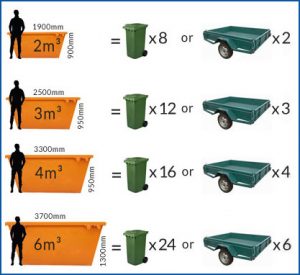Skip Bin Rental Duration Explained: Your Comprehensive Guide
Skip bins have become an essential part of waste management for homeowners, businesses, and construction sites alike. Understanding the rental duration of a skip bin is crucial for effective planning and efficient waste disposal. This article provides an in-depth look at skip bin rental duration, factors affecting it, and tips for maximizing your rental experience.
What is a Skip Bin?
Definition and Purpose
A skip bin is a large, open-top container designed for collecting and transporting waste materials. They are commonly made of steel and come in various sizes to accommodate different types of waste. The primary purpose of a skip bin is to provide an efficient and convenient way to dispose of unwanted debris, making them popular for various projects, including:
- Home renovations: Disposing of old furniture, fixtures, and construction debris.
- Gardening: Collecting green waste and landscaping debris.
- Commercial waste management: Handling large volumes of waste from businesses and construction sites.
Understanding Skip Bin Rental Duration
Typical Rental Periods
The duration for which you can rent a skip bin varies widely based on several factors. However, most skip bin rental companies offer a standard rental period ranging from 1 to 14 days. Here’s a breakdown of typical rental durations:
- Short-Term Rentals: Many skip bin companies offer short-term rentals, usually lasting 1 to 3 days. This option is ideal for quick projects, such as small home cleanouts or garden waste removal.
- Medium-Term Rentals: If your project requires a bit more time, medium-term rentals typically last between 4 to 7 days. This duration is suitable for home renovations or larger cleanouts.
- Long-Term Rentals: For extensive projects, such as major renovations or construction work, long-term rentals of 8 to 14 days are available. Some companies even offer flexible long-term rental agreements for ongoing projects.
Understanding Rental Duration Terms
When renting a skip bin, it’s essential to understand the terms related to rental duration. Here are some key terms you may encounter:
- Initial Rental Period: The standard duration for which the skip bin is rented, typically included in the quoted price.
- Overtime Fees: If you exceed the initial rental period, many companies charge overtime fees. It’s crucial to clarify these fees with your rental provider to avoid surprises.
- Extension Options: Some rental companies allow you to extend the rental period for an additional fee. This flexibility can be beneficial if your project takes longer than expected.
Factors Influencing Skip Bin Rental Duration

Skip Bin Rental Duration Explained
1. Type of Project
The nature of your project significantly affects how long you’ll need a skip bin. For example:
- Small Projects: Quick cleanouts or minor landscaping tasks may only require a skip bin for a day or two.
- Medium Projects: Home renovations or larger cleanouts often necessitate a rental period of 3 to 7 days.
- Large Projects: Construction sites or extensive renovations might require longer rental durations, ranging from 1 to 2 weeks or more.
2. Local Regulations
Different regions have specific regulations regarding waste disposal and skip bin placement. Depending on local rules, you may face restrictions on how long a skip bin can remain on your property. Always check with your local council or waste management authority to ensure compliance.
3. Availability of Bins
The availability of skip bins can also influence your rental duration. During peak seasons, such as spring and summer, rental companies may experience high demand, affecting their ability to deliver bins quickly. Booking in advance can help you secure a bin for your desired duration. https://woodysskips.com.au/
4. Type and Size of Bin
The size and type of skip bin you choose may impact your rental duration. Larger bins typically accommodate more waste, allowing for longer rental periods without needing a swap-out. Conversely, smaller bins might fill up quickly, necessitating additional rentals or longer durations.
Best Practices for Managing Your Skip Bin Rental Duration
1. Plan Ahead
Before renting a skip bin, outline your project and estimate how much waste you expect to generate. This preparation helps you choose the right bin size and rental duration, minimizing the risk of delays.
2. Choose the Right Bin Size
Selecting the appropriate skip bin size for your project is crucial. Common sizes include:
- 2 cubic meters: Ideal for small cleanouts or garden waste.
- 4 cubic meters: Suitable for larger cleanouts or minor renovations.
- 6 cubic meters: Perfect for significant home renovations or landscaping projects.
- 10 cubic meters and larger: Recommended for construction sites or commercial waste management.
3. Communicate with Your Rental Company
Maintaining open communication with your skip bin rental provider can help ensure a smooth experience. Discuss your project needs, expected rental duration, and any potential changes that may affect your timeline.
4. Avoid Overloading the Bin
Overloading a skip bin can lead to safety hazards and additional charges. To avoid issues, familiarize yourself with the bin’s weight limit and what materials are permitted. This knowledge will help you manage your waste more efficiently and keep your project on schedule.
5. Schedule Pick-Up in Advance
If you anticipate needing your skip bin for an extended period, consider scheduling pick-up in advance. Many companies allow you to pre-book pick-up, ensuring your bin is collected promptly once you’re finished.
Conclusion
Understanding skip bin rental duration is vital for effective waste management and project planning. By considering factors such as project type, local regulations, and bin availability, you can choose the optimal rental duration for your needs.
Effective communication with your rental provider and planning ahead will enhance your experience, ensuring your waste disposal process is seamless. With the right approach, renting a skip bin can significantly simplify your waste management efforts, allowing you to focus on what truly matters—completing your project successfully.
